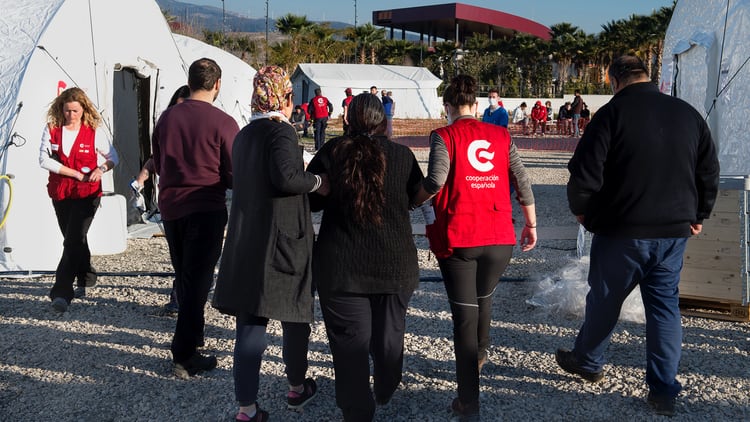The Diplomat
Spain doubled its budget for humanitarian action abroad in the last three years, according to data provided by the Spanish Agency for International Development Cooperation (AECID).
On the occasion of last Saturday’s celebration of International Humanitarian Day, the AECID, which is part of the Ministry of Foreign Affairs, stressed on its website that Spanish humanitarian action has, in recent years, reinforced its response to the crises that have the most serious impact on the most vulnerable populations.
Currently, 362 million people in the world require humanitarian aid -according to the United Nations Global Humanitarian Report- in a global scenario characterised by the consequences of COVID-19, conflicts such as Russia’s aggression against Ukraine and its impact on food insecurity, and the advance of climate change.
Between 2019 and 2023, AECID’s humanitarian budget increased by more than 100%, from 44.6 million euros in 2019 to 101 million euros in 2022.
Thus, last year, Spanish Cooperation increased its action in seven prioritised humanitarian contexts: the regional crisis in Syria, Latin America and the Caribbean, the Sahel, Sahrawi refugee camps, Palestine, Afghanistan and Ukraine, in addition to providing assistance to humanitarian emergencies in different regions of the world, including the earthquake that affected Turkey and Syria in February this year.
These figures confirm the upward trend of previous years and are in line with the objective of allocating 10% of Spanish Official Development Assistance (ODA) to Humanitarian Action by 2030, a commitment included in the Law on Cooperation for Sustainable Development and Global Solidarity, approved last February.
According to the World Food Programme (WFP), the number of acutely food insecure people rose from 145 million in 2019 to 349 million in 2022 in a severe food crisis that continues to worsen, especially in certain regions of Sub-Saharan Africa and the Middle East.
In response to this situation, in January this year, Prime Minister Pedro Sánchez announced a 14.4 million euro Shock Plan against Food Emergencies in the Sahel, Horn of Africa and Yemen, including 4.4 million euros for the “Grain from Ukraine” initiative, which finances the transfer of Ukrainian cereals to developing countries.
The Shock Plan allocation is in addition to the 236.5 million euros for food security actions also announced by the Prime Minister in September 2022 during the ministerial week of the United Nations General Assembly.
On the other hand, over the last year, Spanish Development Cooperation has reinforced its commitment to the quality of humanitarian action, in line with the “Grand Bargain” agreement, which emerged from the World Humanitarian Summit in Istanbul in 2016, with the aim of maximising the effectiveness and efficiency of humanitarian funding and response.
To achieve this, Spanish humanitarian action managed by AECID supported local organisations, with 22% of the humanitarian budget going as directly as possible to local humanitarian actors.
A greater commitment to localisation, according to AECID, implies reinforcing the capacities of these actors to improve their response to humanitarian crises and contributes to the long-term sustainability of humanitarian actions.
In addition, Spanish Development Cooperation continues to maintain its commitment to the gender approach in humanitarian action, having allocated nearly 27% of the total budget for 2022 to humanitarian actions that mainstream the gender approach or that are specifically aimed at supporting projects focused on the rights of women and girls.
The International Day of Humanitarian Action recognises the work of humanitarian workers who risk their lives every day; and commemorates the 20th anniversary of the 2003 terrorist attack on the UN headquarters in Baghdad, which killed 22 humanitarian workers.
Last year was the most violent in the last decade for international humanitarian personnel, who suffered a total of 444 attacks, resulting in 143 wounded professionals, 116 deaths and 185 kidnappings, according to United Nations data.
AECID reaffirms its commitment to the security of humanitarian personnel, which is key to ensuring that humanitarian aid arrives on time and is as effective as possible for the populations that need it most, AECID concludes.







